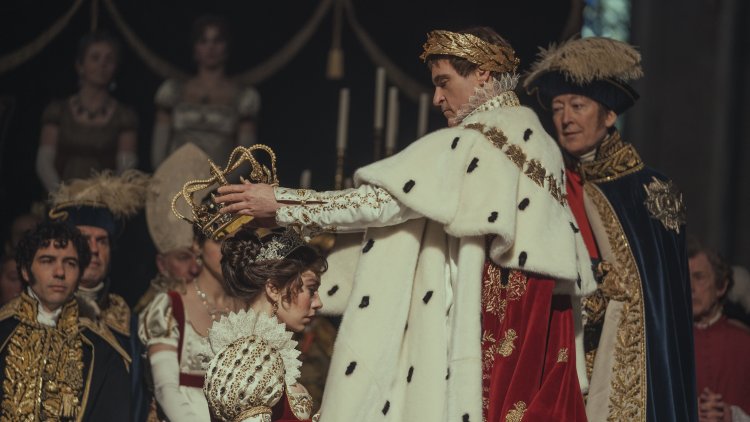Napoleon

As a proud and pale Marie Antoinette (Catherine Walker, "A Dark Song") defiantly paraded toward a guillotine for her execution, a Corsican gunnery officer yearned for a promotion. French Army Commissioner Paul Barras (Tahar Rahim, "A Prophet") would make him a general after the officer retook the port of Toulon after an Anglo-Saxon siege. Six years later, that general would stage a coup and become Emperor of France. His name was “Napoleon.”
Laura's Review: C+
Working from a script by his “All the Money in the World” writer David Scarpa, director Ridley Scott ("Alien," "House of Gucci") has attempted an epic on the life of Bonaparte (Joaquin Phoenix, “Gladiator”) from the waning days of the French Revolution to Napoleon’s death in exile on St. Helena by equating his rise and fall with his marriage, then divorce from Josephine de Beauharnis (Vanessa Kirby, "Mission Impossible's" White Widow). While the movie works in fits and starts, it suffers from a sleepy-eyed performance from Phoenix which emphasizes Napoleon’s theoretical sleep apnea, a lack of sexual or romantic chemistry between him and Kirby, and historical blunt force over political clarity. After almost two and a half hours of watching Napoleon, the film’s most memorable scene is Antoinette’s march to the gallows from its opening moments.
The siege of Toulon illustrates Bonaparte’s willingness to join the fray, scaling a ladder to engage in hand-to-hand combat. Scott’s special effects supervisor Neil Corbould seamlessly swaps in mechanical horses in multiple battle scenes, like the one in which Napoleon’s steed takes a cannonball to the chest. When Napoleon crouches down beside the animal, we expect sentiment. Instead, he retrieves the metal ball, tosses it to his brother Lucien (Matthew Needham), and tells him to ‘give it to mother.’ But while mother Letizia (Sinéad Cusack) seems important to her son, we never learn about the family’s dynamics, nor what propels Napoleon’s ambition other than ego and his stated love of country. The film jumps from Bonaparte’s inclusion in France’s ruling council to the ousting of Robespierre (Sam Troughton) to Napoleon’s coup with little in the way of explanation for why these things came to pass.
There are similar problems in the relationship with Josephine, the wife of an executed aristocrat with two children (who promptly disappear) six years Napoleon’s senior who he is immediately besotted with after spying her at a party. While Scott implies the great love of Napoleon’s life is responsible for his ascension (and his divorce of her for failing to produce an heir with his fall), Josephine appears to merely tolerate the man, their sex scenes neither sensual nor romantic, her taking of a lover while Bonaparte’s troops take potshots at Egypt’s Great Sphinx and pyramids a public humiliation. While he states he cannot live without her, a return of the sentiment at his prompting fails to convince. Two beats later, Scott is staging Napoleon’s self crowning at his coronation and his crowning of his empress using Jacques-Louis David’s famous painting as a template.
The film is punctuated with many of Napoleon’s famous battles, Austerlitz, with its hidden frozen lake tripping up opposing armies attempting to flee on horseback, an old-fashioned spectacle, director of photography Dariusz Wolski ("The Martian," "House of Gucci") capturing men and their thrashing steeds sinking in swirling blood and water. But the tactical nature of the battles isn’t defined as well as it should be, using such tropes as Napoleon muttering commands from atop a hill as troops respond hundreds of yards away (a film which illustrates battle tactics clearly is 1993’s “Gettysburg”). After Napoleon divorces Josephine (but continues to visit her) in favor of the young Duchess Marie-Louise (Anna Mawn), he will march to Russia with 600,000 troops, refuse to believe his enemy burned down their own city rather than let him take it (in a scene rather obviously rendered in CGI), continually report that event as his own deed, and return with 40,000, the enormous loss prompting his first exile to Elba.
When he’s not wowing us with underwater shots, Wolski’s palette is too drained of color, which, while giving the impression of natural light, is nonetheless too drab, a wash of gray. Music is an interesting mix of jaunty folk tunes accompanying the revolution replaced later a more solemn men’s choir. The film’s tone is odd with moments where I honestly wondered if Scott was going for comedy, Kirby and occasionally Phoenix in on the joke. And while Phoenix, an actor I think one of our best, delivers glowering arrogance and petulant jealousy, the performance is lacking in insight into Napoleon’s motivations and delivered in an American accent. The film also stars an incredulously flippant Rupert Everett ("My Best Friend's Wedding") as the Duke of Wellington, with Edouard Philipponnat as Tsar Alexander and Miles Jupp as Emperor Francis II.
While many films these days are too long, “Napoleon” suffers from trying to tell too big a story within a 158 minute run time and it never catches fire, keeping us from fully engaging.
Apple Original Films releases "Napoleon" in theaters on 11/22/23. Its streaming date has yet to be announced.

